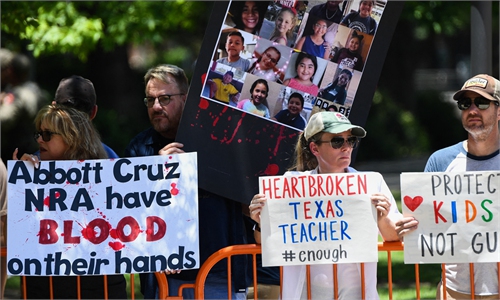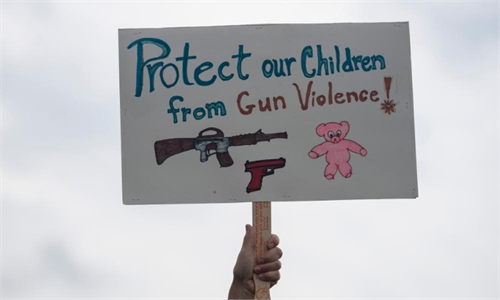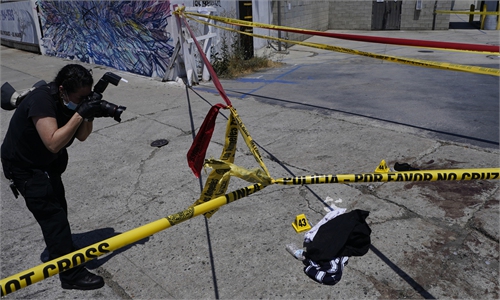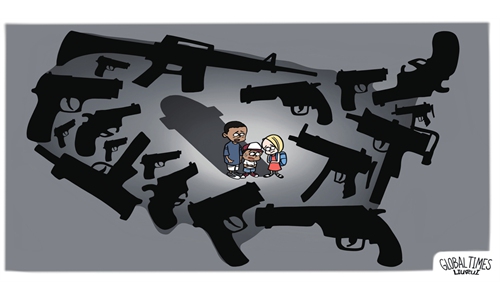Supreme Court rules against NY gun law in huge step backward in tackling mass shootings
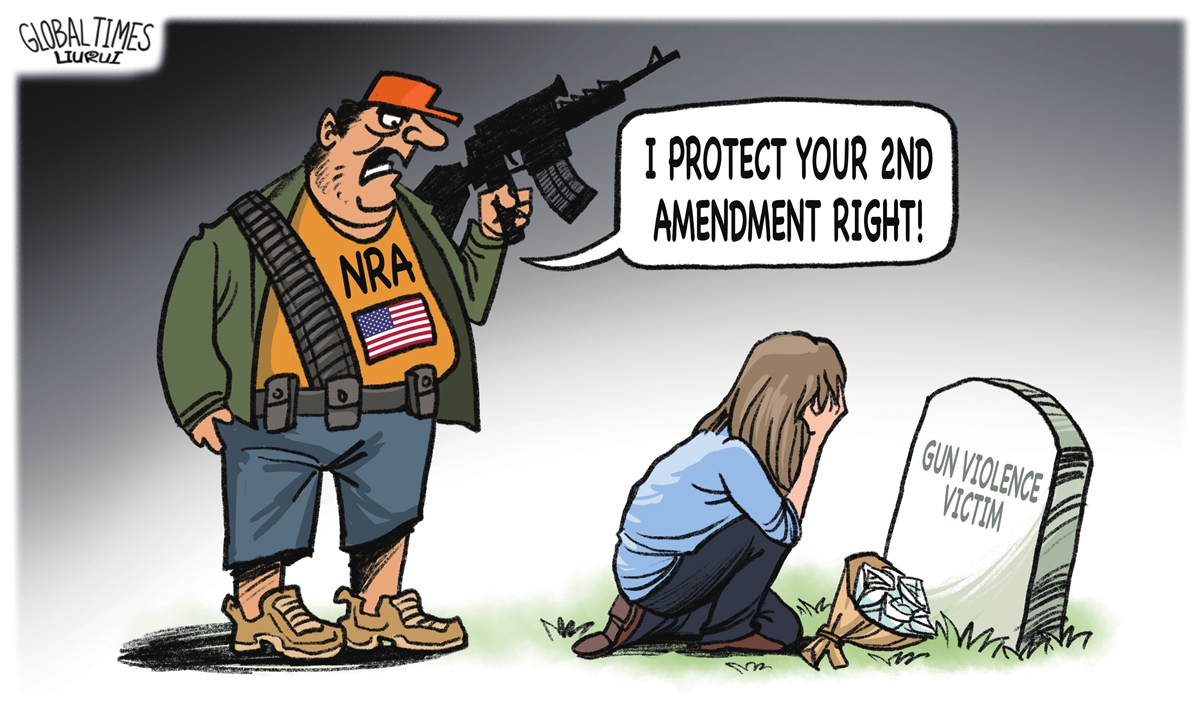
US gun violence Illustration: Liu Rui/GT
When American gun advocates celebrate their new triumph after the Supreme Court on Thursday ruled out a century-old New York law restricting the carrying of concealed firearms, observers saw the US lay bare to the world its inability in front of a real-life problem, deep social divisions, and indifference to the lives of ordinary people in fresh bloodshed left by mass shooting victims.
The Supreme Court decision was a huge step backward in light of tackling fierce gun violence in the country, and it came in contradiction to a bipartisan gun control act that was passed in the Senate also on Thursday, highlighting the US' system failure to deal with the problem, experts said.
The New York gun law, which was in existence since 1911, requires people to carry a gun in public places with "proper cause" and stipulates that carrying concealed firearms without a license constitutes a crime, CNBC reported.
Six conservative justices, three of whom were nominated in the Trump administration, voted to invalidate the law, only weeks after mass shootings at a grocery in Buffalo, New York and another at an elementary school in Uvalde, Texas, left dozens dead and injured, and reignited national debate on US gun laws.
Twenty-five US states require a permit to carry concealed weapons in public, according to the Giffords Law Center to Prevent Gun Violence. Among those, New York is one of eight states, as well as DC, that stipulate someone may be denied a permit if they have not demonstrated a strong reason to carry a weapon in public. The other 17 states are inclined to issue such a permit with little to no discretion.
With the New York law ruling, similar cases may be brought to the court, leaving states' already limited efforts on gun control moves all in vain, many people predicted.
Lü Xiang, an expert on US studies and a research fellow at the Chinese Academy of Social Sciences, told the Global Times on Friday gun violence has become the epitome of the US' systematic failure — a constitutional right granted by US institutional system was abused and developed into a cancer, yet the US system can hardly deal with the disease.
The Supreme Court ruling stated New York's law violated the Constitution's Fourteenth Amendment — which says citizens have a right to equal protection under the law — because it "prevents law-abiding citizens with ordinary self-defense needs from exercising their right to keep and bear arms" as authorized by the Second Amendment, CNBC reported.
The Second Amendment was born in a unique historical background to secure arms-carrying militia, but today it was frequently cited by gun advocates to negate minor restrictions on gun ownership, Lü said.
Such "minor restrictions" included the Bipartisan Safer Communities Act, which was approved by the Senate on Thursday. The legislation still needs to clear the House, where it is expected to pass, and is likely to be signed into law by US President Joe Biden.
The legislation aims to enhance background checks for individuals under the age of 21 who seek to buy firearms, provide $500 million for more mental health service providers in schools, and encourage state "red flag" laws, which allow a court to temporarily block people from buying guns if they're a threat to themselves or others, the US News reported. A provision to prevent people with domestic violence record to obtain a gun was also added to the bill.
The bill was hailed by US media as a milestone in decades because the Congress finally broke the repetitive cycle of promising reforms after horrific shootings that lead to inaction and fruitless efforts after most Republicans remained opposed to such legislation.
Yet the Supreme Court ruling against the New York law makes the Bipartisan Safer Communities Act look like a joke and legal interpretation by the court has a bigger and more profound impact on American society than a bill or president executive order, experts said.
Texas Senator John Cornyn, lead negotiator on the bipartisan gun reform bill, is facing a backlash from his own Republican party — booed and heckled at a recent Republican convention in Houston, the Guardian reported.
The senator was dubbed a "two-faced politician" by gun rights groups like the National Association for Gun Rights and Texas Gun Rights. Stepping out of his party's line on gun rights - even if the proposed reforms are mild - could cost Cornyn politically in his home state, according to the Guardian report.
Behind US politicians are not only the National Rifle Association or other gun lobbyists, but an entire military-industrial complex. "Which US lawmaker can escape the influence and investment of the military-industrial complex? They are almost everywhere," Lü said.
It is obvious that the bipartisan move to slightly restrict gun ownership is "more of a gesture without substance," the expert said.
Wei Nanzhi, a research fellow with the Institute of American Studies at the Chinese Academy of Social Sciences in Beijing, told the Global Times the power struggle between the state and federal government, the political battles between the two parties, and the existence of a military-industrial complex make gun violence often discussed but never addressed in the US.
Public anger, grief and fear against gun violence, a push from a few conscientious politicians, cannot yield changes, Wei said.
After the Texas school shooting in May, support for controlling gun violence hit its highest point in a decade at 59 percent, according to a latest NPR/PBS NewsHour/Marist poll, while 35 percent believe it is more important to protect gun rights.
The new poll also shows an unsurprising sharp partisan divide — 92 percent of Democrats and 54 percent of independents say it's more important to control gun violence, while 70 percent of Republicans say it's more important to protect gun rights.
The division on the administrative and judicial level proved the US system is incapable of tackling the gun violence problem, which encourages some to call for strong government actions while others too disappointed to turn to buy more guns "for self-protection" — further tearing the society apart over the issue, experts said.
With so many guns out there, gun violence and mass shootings increasingly become a way Americans vent their anger and discontent to all sorts of social problems. Diao Daming, an associate professor at the Renmin University of China, said gun violence has become an underlying disease of the US. Whenever social problems intensify, be it racism, income gap, social split, the symptom — gun violence — becomes acute.
The gun control issue in the US is incomprehensible to almost everyone in almost every part of the world outside the US, Lü said, as modern society is a highly organized society, meaning public security is not an individual duty and individuals do not need the right of law enforcement with their own arms.
But Diao pointed out gun ownership, granted by the Second Amendment, has been reinforced by lobbyists as "the core right of being an American citizen." Challenging the right is depriving Americans of being exceptional, Diao said.
The US is anxious to maintain its "exceptional status" and allows no challenge to such exceptionalism, which explains why American politicians felt offended and could react rudely when a foreigner questions this.
Ted Cruz stormed off from a British reporter after the Texas school shooting when asked "why does this only happen in your country?" and Congresswoman Marjorie Taylor Greene, in a similar situation, said "you can go back to your country and worry about your no guns. We like ours here," according to media reports.
The US should take American people's human rights seriously and reflect on why the US has become the world's worst country for gun violence. If it is incapable of doing so or determined to keep deaf to international calls, a human rights investigation by the UN should be conducted, observers said.
